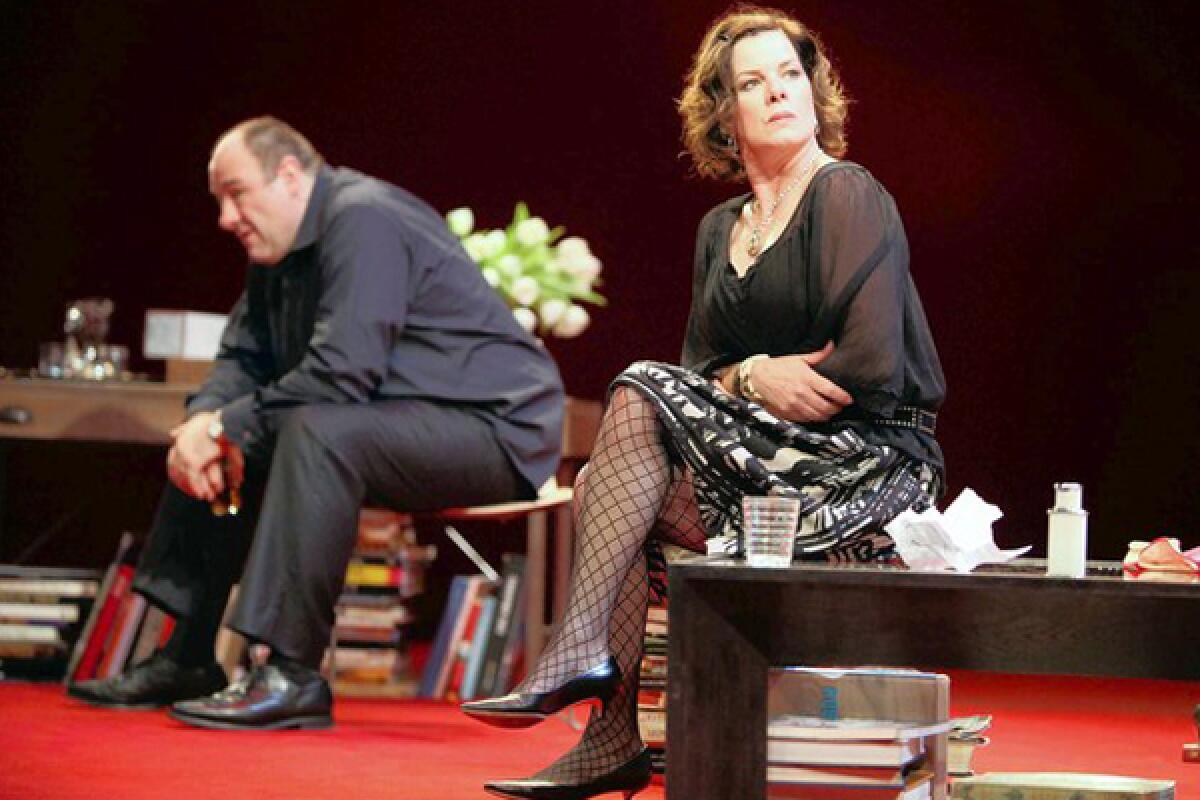Born on Broadway isn’t a sure pedigree

- Share via
This fall, theater fans may be in for a little déjà vu: “Carnage,” “Ides of March,” “A Dangerous Method” and “War Horse” are all films, opening from October through December, that have been adapted from plays. All are also popping up with early buzz, making for an exciting Academy Award season for filmmakers and playwrights alike.
So what’s with the rush to adapt from the stage? Perhaps it’s because plays come with established credentials. As Richard Krevolin, author of “How to Adapt Anything Into a Screenplay,” notes: “They’re a brand, and there’s a feeling of security that if a stage work does well around the world, the investment in the film is more secure than an original screenplay.”
Or maybe, as “Method” filmmaker David Cronenberg suggests, they’re shorthand for “studio executives who don’t seem to know how to read scripts anymore. They can’t visualize anything. But if there’s a play, they can go and watch.”
Whatever the reason, the bad news is that the curtain rarely rises for serious plays in Oscar season. Voters like musicals (“Chicago” won best picture in 2003; Jennifer Hudson won for “Dreamgirls” in 2007), but even there pickings are slim. No play adaptation has won best picture since 1989, when “Driving Miss Daisy” earned four Oscars. Some may make shortlists — “Doubt” and “Frost/Nixon” had five nominations in 2008, and five losses, while last year’s “Rabbit Hole” got Nicole Kidman a lead actress Oscar nomination — but their races ended there.
Studios are clearly banking on making more of an impression this year, though whether a film’s provenance as a play has any resonance in the finished project depends largely on the directors’ choices. The Roman Polanski-directed “Carnage” is a near-literal transfer from Yasmina Reza’s “God of Carnage,” says producer Saïd Ben Saïd, because “Roman didn’t want to tell a story different from the original.”
Instead, he says, the film and the play evolve in real time. “It’s very difficult to make a film like that,” he says. “‘Carnage is an experimental movie, but in the meantime, it’s also a movie for a very large audience.”
Cronenberg brought in original playwright Christopher Hampton to adapt “The Talking Cure” (which itself was adapted from an unmade Hampton script) into a new screenplay for “Method.” What emerged out of a two-act play was an 80-page script.
“David has a genius for economy; I was impressed by the way he pared down every scene to its essentials,” says Hampton.
“It was a very adult collaboration,” says Cronenberg.
Such meetings of the minds aren’t always possible; for “Ides of March,” producer Grant Heslov says he and star-director-producer George Clooney liked Beau Willimon’s “Farragut North” play from a “thematic point of view” but made deep changes in their own script. For example, Clooney’s screen role as a politician existed only offstage in the play.
“You want to open up a play so you can tell the story with pictures rather than words,” says Heslov. “Writing in the theater, the playwright is king — you can’t even change his or her words. But in the screenplay business, it’s much more fluid and loose. The director is definitely king.”
Meanwhile, Michael Morpurgo had written the novel “War Horse” that Nick Stafford based his play on, but screenwriter Richard Curtis took over for the film version. Curtis based his screenplay more on the book than the play, but he says the existence of the play itself helped him “be brave” about his own adaptation.
“My tendency would be to be extremely respectful of a book I like,” he says, “and since the play took great liberties with the book while seeming fundamentally the same, I think people who have read the book and seen the play and see the film feel like they’ll see the same thing — but with all the different qualities you can only get on film.”
It remains a tricky line to walk: how literal to make the work and what version is likely to best work with both audiences and award voters. Truth is, plays often make bigger splashes on television than the big screen: The 2003 adaptation of Tony Kushner’s “Angels in America” won 11 Emmys and five Golden Globes for HBO.
Still, Krevolin seems to agree with Heslov: Movies expand the limited scope of plays and, in the process, improve them. “In Shakespearian plays, someone will run onstage and talk about a battle, but the beauty of film is we can see a thousand extras engaging in a battle,” Krevolin says. “There can be an excitement in opening up a piece of theater to make it come alive on a much grander scale on film.”
More to Read
The biggest entertainment stories
Get our big stories about Hollywood, film, television, music, arts, culture and more right in your inbox as soon as they publish.
You may occasionally receive promotional content from the Los Angeles Times.










